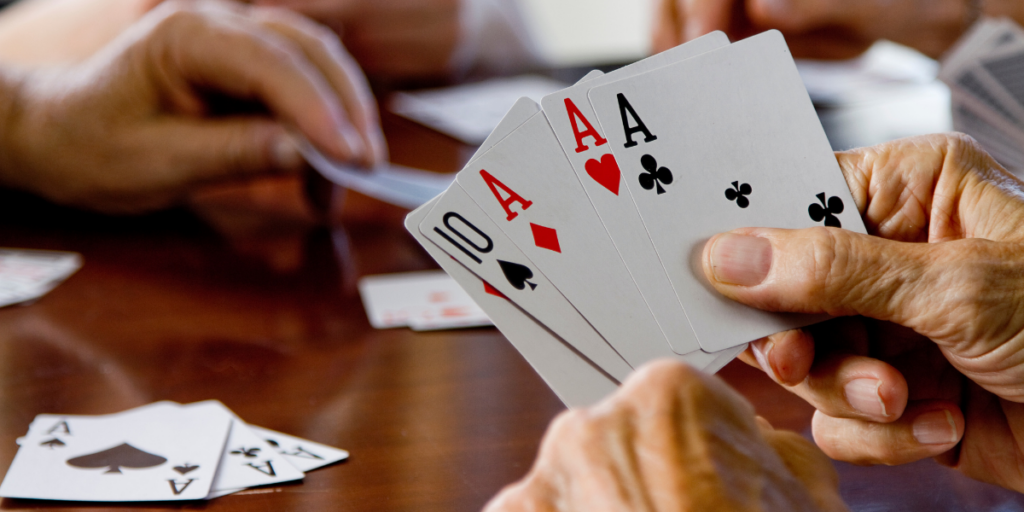It’s likely that you always play the same variation of the well-known card game when you get together at the table for a casual game of poker on game night, but that’s okay since poker is excellent. In fact, it’s one of my all-time favorite card games.
But were you aware that there are tons of other game variations? And I’m not just talking about people taking their clothes off in a chancy game of strip poker.
Throughout this guide, you’ll learn about a brilliant selection of poker card games to bring some diversity to your gatherings and impress your friends with your broadened knowledge of one of the most prevalent card games in the world.
A Bit About Poker
Poker originated in 1829 when French settlers in New Orleans created a game in which players could bluff, fold, or make bets known as Poques, where the name today comes from.
In the beginning, poker was played with a four-card hand, whereas today it’s played with five, which I believe was introduced as the way of gameplay around 1837. At this time, it was also played with a deck of 20 cards; this was until the standard 52-card deck we’re familiar with today was introduced years later.
Today, you have two options when playing poker: you may use a deck of cards, or you can go out and truly impress your friends with a whole poker set, which contains all the chips, cards, and other accessories you’ll need to play.
So, now that we’ve touched on a bit of the original game’s history, let’s look at the other variations.
1. Texas Hold’Em Poker
Let’s start with this one because this is my ultimate top pick out of all the poker games I’ve played over the years.
Texas Hold’em shares many similarities with the original game and is probably famous worldwide.
It was created around the early twentieth century in a town in Texas and quickly became a widespread and much-played card game among poker lovers.
The game can be played with up to 10 players and works much better with a larger group. Although it can still be fun with a handful of people, it’s much more predictable and gets over much quicker.
The game starts with the player next to the dealer playing a small blind and the next player playing a big blind. The rest of the players can choose to check, fold, or bet from here.
The cards and sequences are the same as in a classic game of poker. Ace being the highest and two being the lowest.
2. Iron Cross

Iron Cross is similar in context to Texas Hold’em. I just told you about it, except each player starts with seven cards, although the hand you play with will still be five as usual, so the game has a bit of a twist.
It can be played with between 4 and 7 people, and the name “Iron Cross” comes from the fact that the dealer will place five cards down in the formation of a cross. These are referred to as “community cards.”
After dealing the rest of the cards to the players, the dealer then flips over one of the four cards on the outside of the iron cross for all to see. The middle card is turned over at the end.
Now that this card has been revealed, the betting begins, and the player with the strongest two-card hand takes it.
The second round begins when a second card is flipped, and players match their strongest card against the two upturned community cards.
The game continues like this until you’re down to the center card of the iron cross, at which point players need to reveal the strongest five-card hand using two cards from their hand and the cards on the table. During this stage of the game, you must use two cards running vertically or two cards running horizontally. You can’t have cards from both lines of the cross.
3. 7-Card Stud

Another popular poker card game is 7-Card Stud, which, although still played globally, has diminished slightly in popularity over the years. Personally, though, I still love it. It’s a game that needs to be kept in the mainstream of the poker world.
Similar to regular poker, 7-Card Stud is said to have started in New Orleans in the 1830s, although its exact origins are unknown.
The aim of the game is to win by having the most chips out of the group. You gain these chips by placing bets and having the best hand.
The sequences and hand values are just the same as in poker, too. Still, if you’re unsure what these are, you can find out more information in this more in-depth guide to 7-Card Stud, which goes into much more detail about the rules and gameplay.
4. Baseball Poker
There’s no bat and ball required to play Baseball Poker; just your deck of cards and a minimum of four players is all you need.
Like the other games I’m discussing in this guide, the rules mirror those of a typical poker game, with just a few twists and additions.
If you’re familiar with baseball, you’ll know that in a single game, there are three strikes and nine innings, so, to relate to this, in the poker version, the threes and nines are wildcards.
The deal also differs from standard poker. Each player receives five cards, two of which are dealt face down and one face up, at which point the bets are placed. Two more cards are later dealt to each player before betting continues.
There are now some online versions of baseball poker available, but personally, I don’t think they’ll ever beat a hands-on card game.
You can read more about the rules and get many hints and tips on the best way to win the game with this guide on playing baseball poker.
5. Piranha
Piranha is a matching-type card game similar to poker, where you must match the pot to win.
I think one of the most significant differences between Piranha and Poker is the fact that you don’t need to use three cards from the community cards and two from your hand. If you wish, you can just take one from each. This means the game usually goes on for longer as players have a better chance of being able to place an ante.
The player with the highest hand at the end of the game wins the entire pot, and another round can begin.
6. Pregnant Threes

One of the things I love the most about Pregnant Threes is its simplicity. It’s an excellent way to introduce newbies to poker-style games.
Like poker, the game starts with a five-card hand for each player, and there will be twelve wildcards in total: the threes, sixes, and nines.
One thing I always find in this game is that anything can happen, and five-of-a-kind hands are not uncommon, so make sure you’re confident in your hand before placing any bets.
7. Horse Poker
You need to be a pretty experienced poker player covering a number of games because Horse Poker is a complex mixture of Texas Hold’em, 7 Card Stud, Ohama Eight or Better, and Razz. So, as Liam Neeson might say, you’ll need a very particular set of skills.
One of the most complicated things about the game is the fact that with each round, the rankings, rules, and betting all change, so you need to pay attention throughout the entire game.
The game moves in a full rotation around the table, and the game will change from one to another at random times, starting with Texas Hold’em and ending with a 8 or better. You can tell when the game has changed by the number of cards you’ve dealt, but the dealer should notify all players when a change occurs.
Because Horse Poker is a game full of complexities, understanding the rules before you start is vital. I recommend downloading this complete guide to Horse Poker, which has been written by a professional poker player.
8. Anaconda

Unlike Horse Poker, Anaconda requires minimum skills and relies mainly on potluck, making it great for anyone new to poker-style games. The only thing you need to know is the order of rankings, which is the same as in any classic poker game. If you’re unsure, you can refer to this handy poker guide.
The aim of the game is to pass cards around the table to improve your hand. But before any passing of cards takes place, each player must place a wager in the pot.
For the rest of the round, you’ll pick two cards from your hand to pass to the next player, who will do the same, and so on, so each player will remain with seven cards in their hand at all times.
As I already stated, the player with the best hand at the end wins. However, the interesting thing here is that they only win half the pot. Guess who wins the other half? The loser, the person with the worst hand—you heard that right. So technically, in Anaconda, even the losers are still champions.
Summary
Well, I bet you didn’t realize there were so many exciting variations of the old-fashioned poker game, did you? Now you do, and you know what? There’s even more out there, which maybe I’ll tell you about some other time, but for now, if you’re still interested in learning more, take a look at my guide to Irish Poker or learn how they do things in Asia with the rules of Indian Poker.


